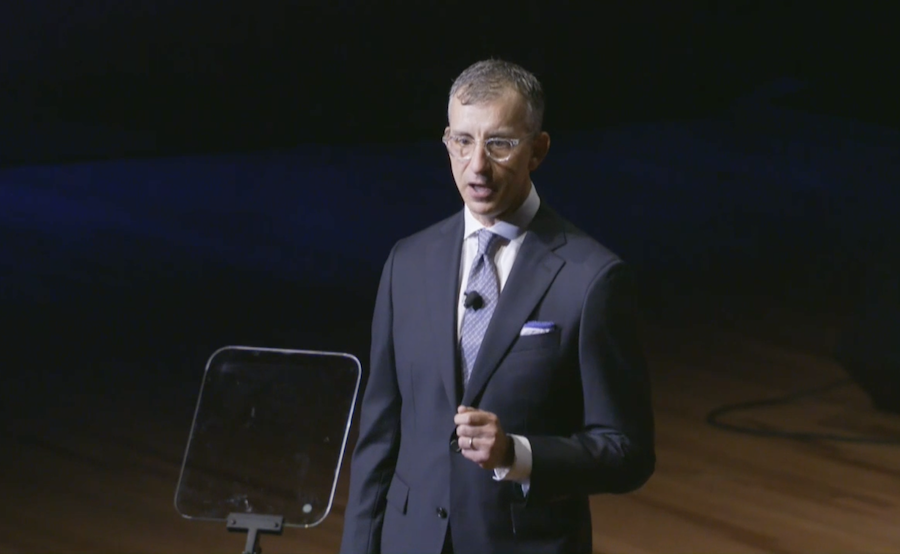Last night saw the publishing and songwriter community gather at New York City’s Lincoln Center for the first in-person NMPA Annual meeting since 2019. From the biggest issues facing the publishing sector to new initiatives and even lawsuits, here are the highlights from the event.
The upcoming CRB IV battle
President David Israelite (pictured above) kicked off proceedings with the upcoming CRB IV battle. “There is no matter more important to the future of songwriting than the battle being waged at the Copyright Royalty Board (CRB),” he stated. “This is by far the most important revenue stream to the industry.”
The trial, which was originally due to commence on July 5th 2022, has been delayed until after Labor Day, explained Israelite, and will determine how much giant tech companies will pay songwriters over the next five years.
“Amazon, Apple, Google, Spotify, and Pandora. Those giant technology companies will be arguing for the lowest rates in the history of digital music,” said Israelite. “In addition, their proposals are littered with hidden cuts and gimmicks designed to fool the songwriting community such as defining revenue in a way that could drastically cut rates even if the same percentage of revenue number was in place.”
Based on industry standard assumptions regarding revenue and subscriber projections over the next five years, he explained, the difference between the NMPA’s proposal (outlined in the slide below) and the one from Amazon and Spotify is a staggering sum of more than $7.8 billion.
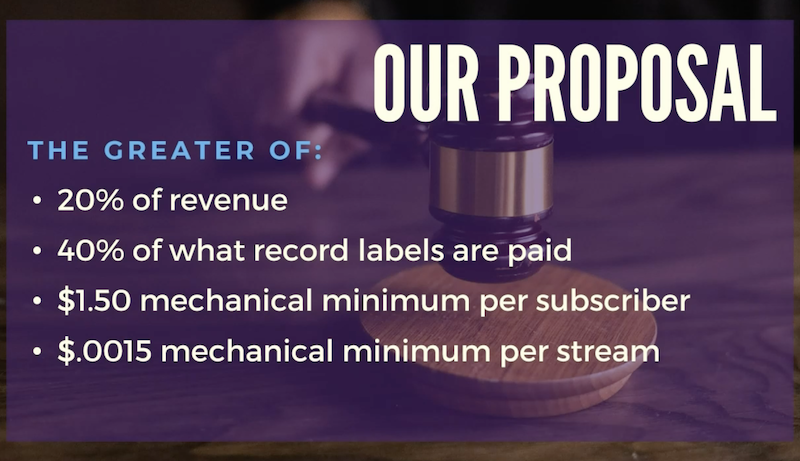
Source: NMPA
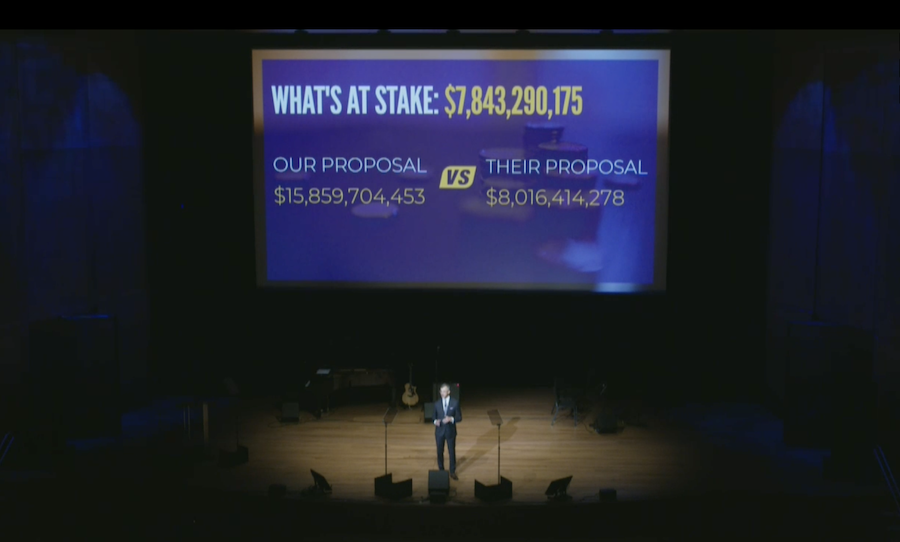
Source: NMPA
The MLC presents new industry wide data
Israelite praised The Mechanical Licensing Collective (MLC) for not only opening on time and on budget, but for achieving a historically high 85% match rate and growing in its first 18 months of existence.
He also announced a new benefit from the MLC – a “treasure trove” of industry wide data that has never been made publicly available until now. “There are 47 different music services that operate 151 different models that pay mechanical royalties to songwriters. We now know that in 2021, those services combined generated nearly $9.8 billion in revenue. […] Over 96% come from the same five companies that are fighting to cut songwriter rates in the CRB process: Amazon, Spotify, Apple, Google, and Pandora.”
According to this newly uncovered data, those services paid record labels $5.7 billion in 2021, or 58.6% of the revenue pool. This is significantly higher, Israelite explained, than the 52% that is often reported. “To be clear,” he added, “songwriters being paid properly does not mean that artists and labels need to be paid less. It is unconscionable that digital delivery services take three times the amount they pay the songwriters who make their businesses possible.”
Songwriters and music publishers were paid just over $1.3 billion from digital services in 2021, the figures reveal, though Israelite is keen to point out that this is based on 2017 rates because the DSPs have been dragging out the CRB III appeal. “That means that all of our 2021 revenue data is artificially low due to the digital services paying under an outdated and anaemic rate structure,” he said.
This new data has also revealed, for the first time, exactly what each service pays and how much it pays per stream. “This is going to make a lot of people in the audience uncomfortable,” said Israelite, sharing the following slide which lays out how much (or little) the three largest services (that represent 81% of the revenue and 88% of the subscribers) pay per 1 million streams.
This information will now be made available by the NMPA, he explained, on a monthly basis moving forward.
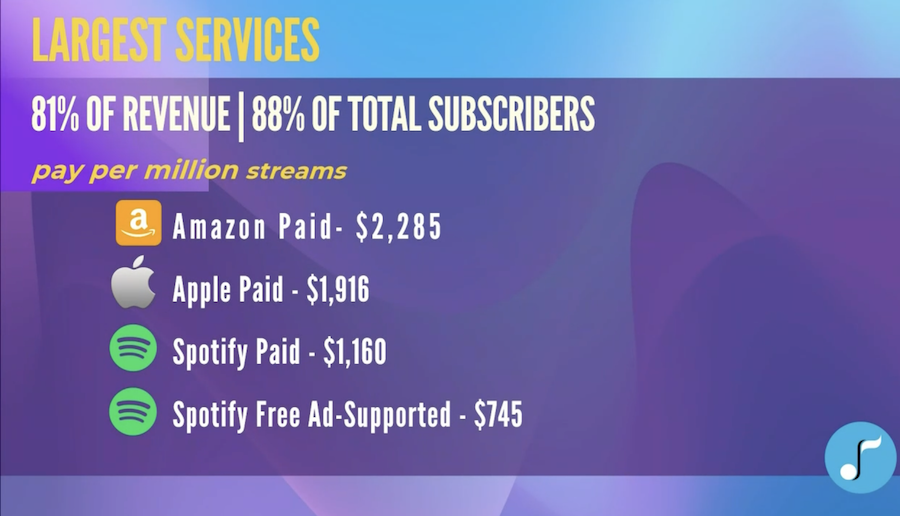
Source: NMPA
2021 US Music Publishing Revenue
Next on the agenda was US music publishing revenue for 2021, which saw a 15.31% growth on 2020 to reach $4.7 billion. That breaks out to: 51% performance, 25.8% synch, 18.5% mechanical and 4.7% other.
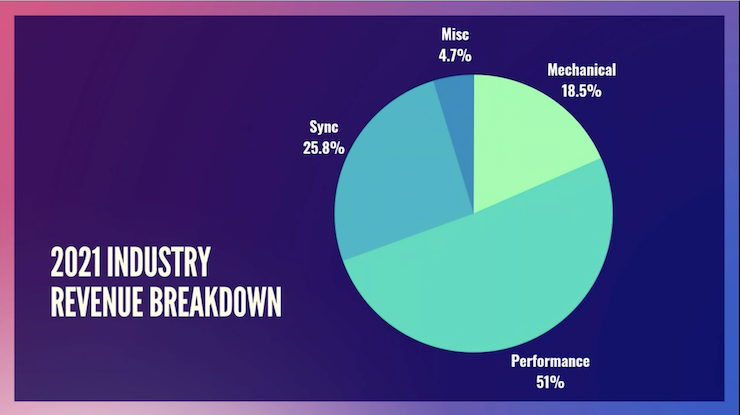
Source: NMPA
“One of the most important stories from this data,” said Israelite, “is the fact that nearly 30% of the industry’s revenue sources came from places that originally claimed they did not have to license or pay songwriters.” The NMPA, he explained, have now exceeded $1.1 billion of legal recoveries for its members and their songwriter partners, developing partnerships with the likes of TikTok, YouTube, Twitch, Roblox, and Triller.
If the DSPs had paid music publishers under the original CRB III decision, instead of the outdated 2017 rate structure, and if digital radio services like SiriusXM and Pandora paid the same amount that they pay record labels and artists, publishing revenue would have been $1.2 billion higher, explained Israelite.
The battle over radio royalties is not one that is going away any time soon. “We were informed that the Radio Committee is preparing to sue ASCAP and BMI as early as the end of the day today to fight a new war against songwriters, to try to pay them less,” he added. “And we will support them every step of the way in that fight as well.”
Crackdown on music in apps
Last year the NMPA announced a crackdown on the use of music in gaming. This year, their focus is on unlicensed music in applications.
“Earlier today, NMPA on behalf of seven representative publishers filed a lawsuit against an app known as Vinkle,” said Israelite. Vinkle, which describes itself as a “video editor and music editor”, offers thousands of templates that include unlicensed music. The NMPA has also sent cease and desist letters to nearly 100 apps that use music without proper licenses, he explained.
In addition, the NMPA has sent formal notices to both Apple and Google. “The responsibility of licensing music is not just limited to the app companies themselves, the app stores, which empower these apps also have responsibilities to make sure that the apps that they make available to their customers are legal and not infringing,” he added.
Israelite went on to announce two new strategic partnerships to assist in the NMPA’s battle against apps, one with Songclip, a facilitator for licensing music in apps, and another with ACT, the App Association. “If you are an app that is using music illegally, you can make the smart choice to resolve your transgressions and become a legitimate business partner, or you can shut down,” he warned.
NMPA NOTES Program
“Tonight, we are announcing a new program to take the partnership between music publishers and songwriters to the next level,” said Israelite, introducing The NMPA’s new NOTES Program (which stands for the National Organization to Empower Songwriters).
The mission of the program, he explained, is to help bring together songwriters to advocate for better treatment of music creators. “The organization will provide educational material and empower songwriters to engage directly with decision makers in Washington DC and beyond.”
The first priority for the program is to encourage songwriters to become active in the many songwriter advocacy groups in existence, including The Nashville Songwriters Association International (NSAI), Songwriters of North America (SONA), and The Society of Composers and Lyricists (SCL).
The NMPA NOTES program also intends to highlight a prestigious group of top songwriters, Israelite explained. “NMPA has certified 5,810 songwriters with gold and platinum designation as part of our partnership program with the RIAA. By definition, these songwriters are the most commercially successful songwriters in the industry.”
